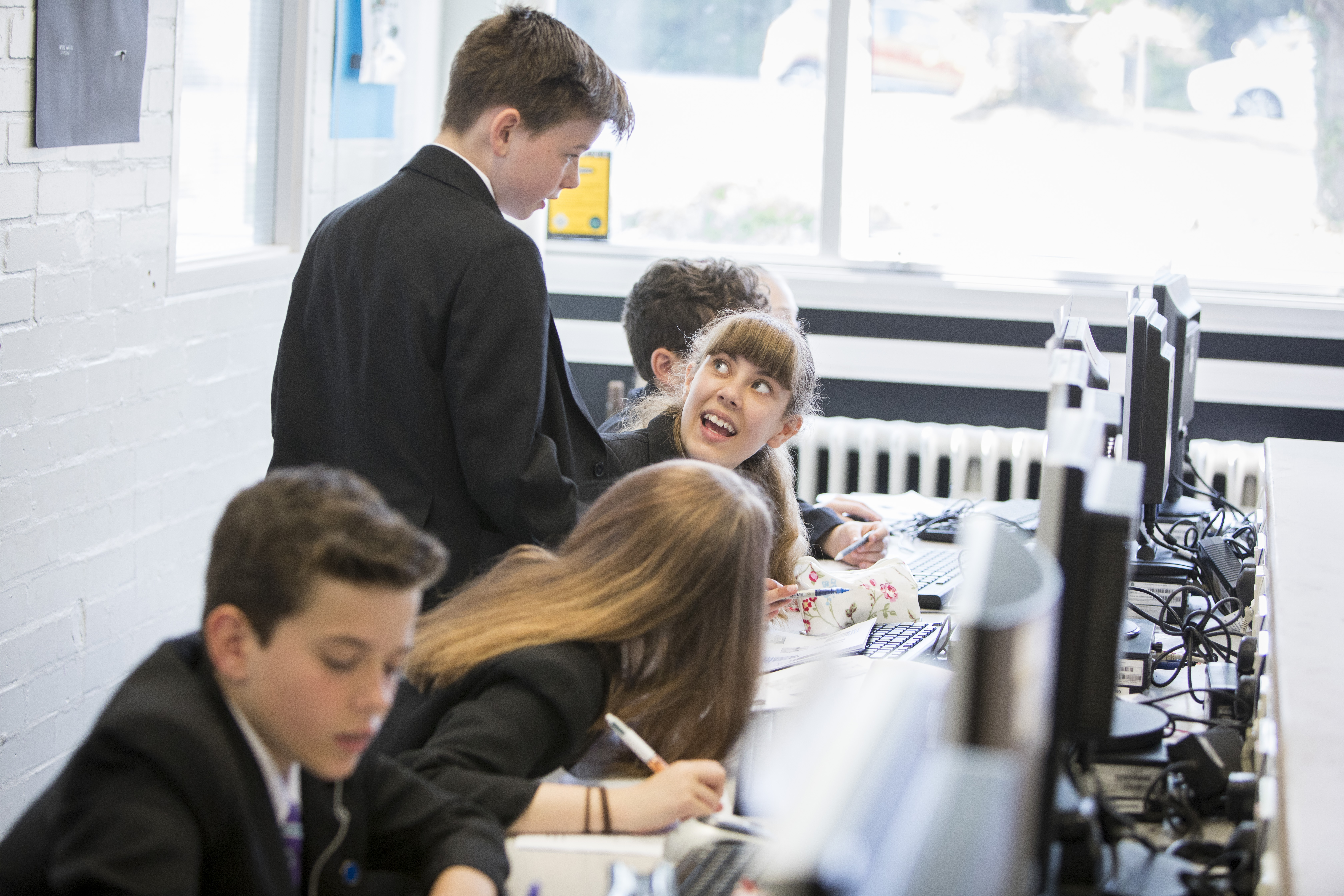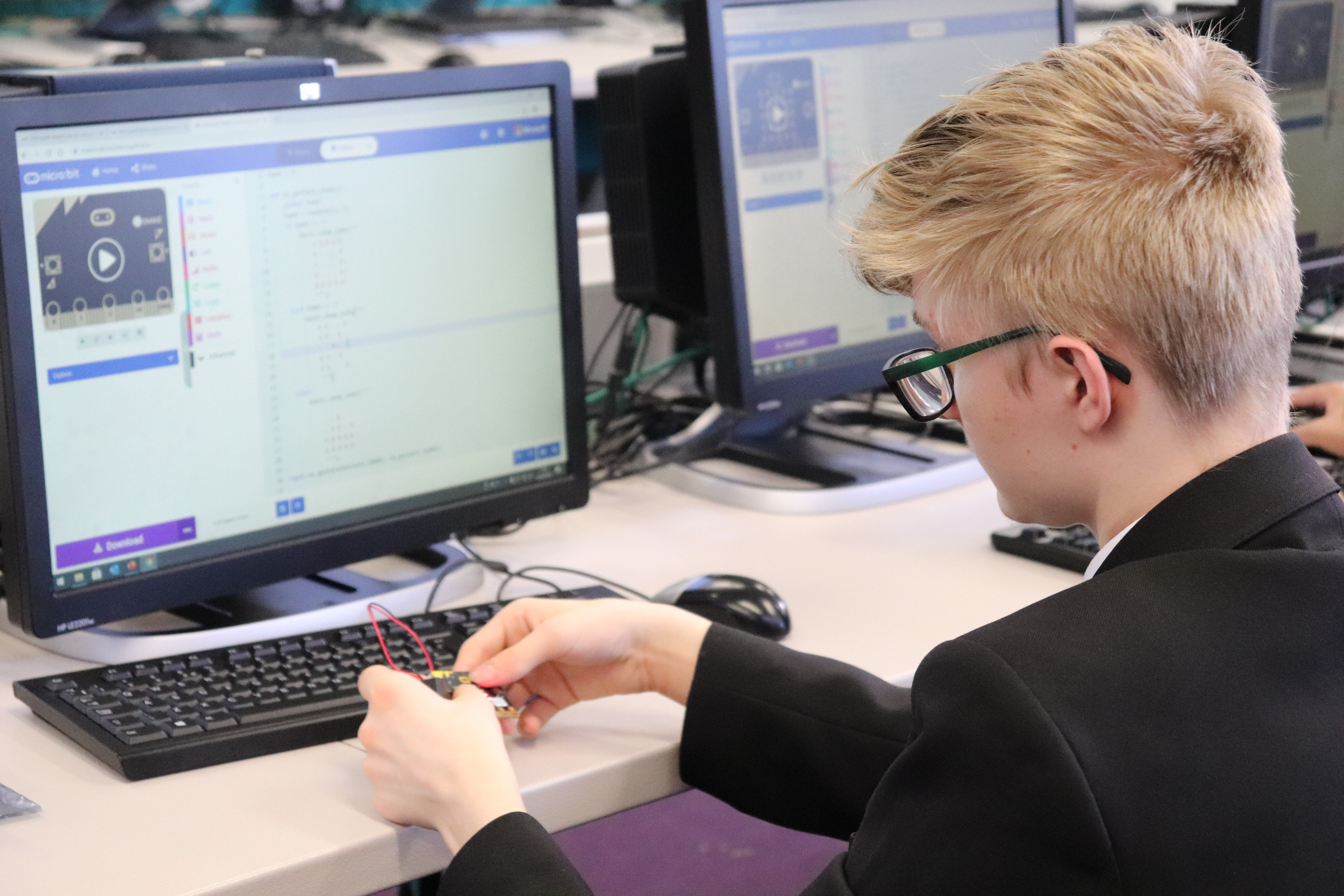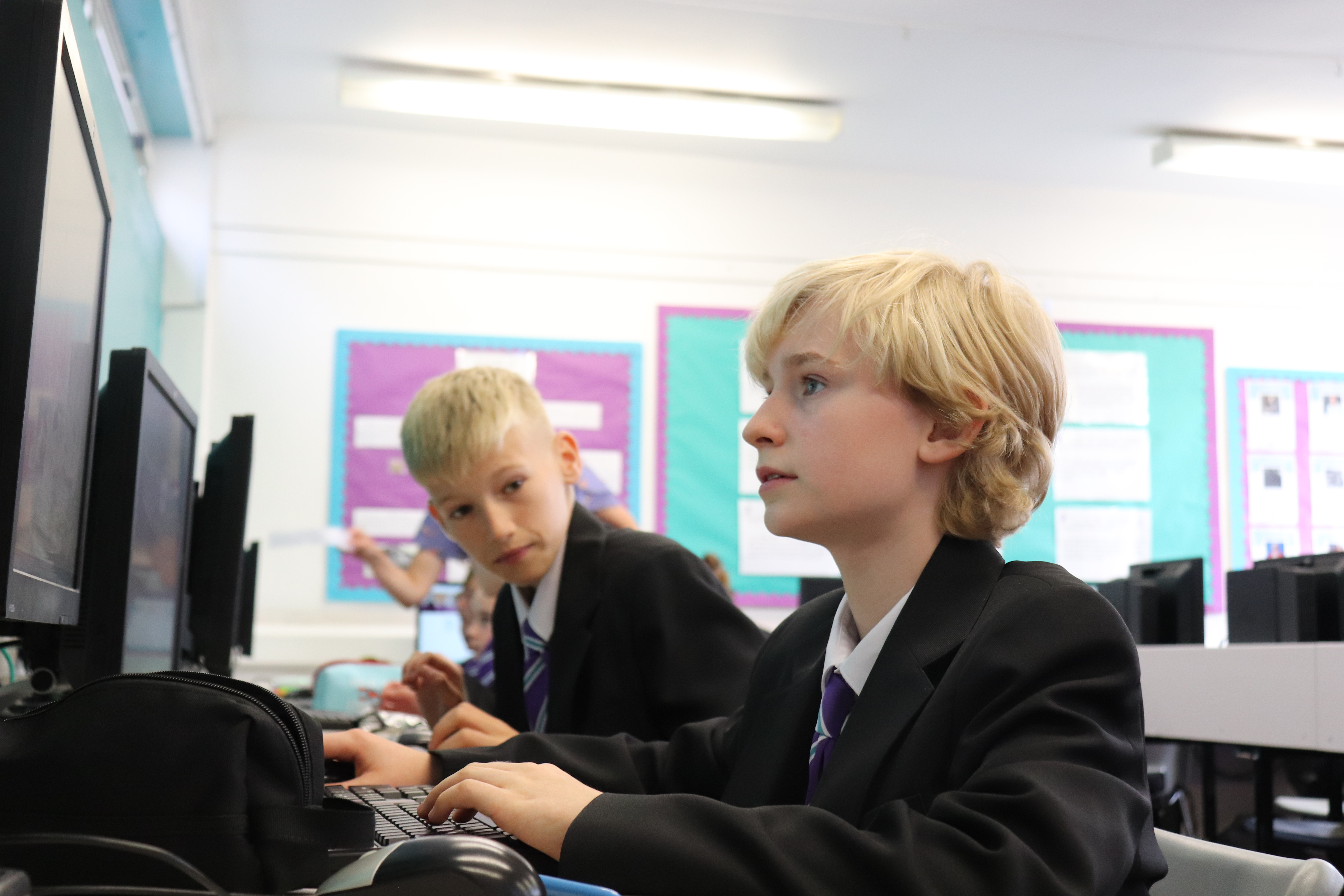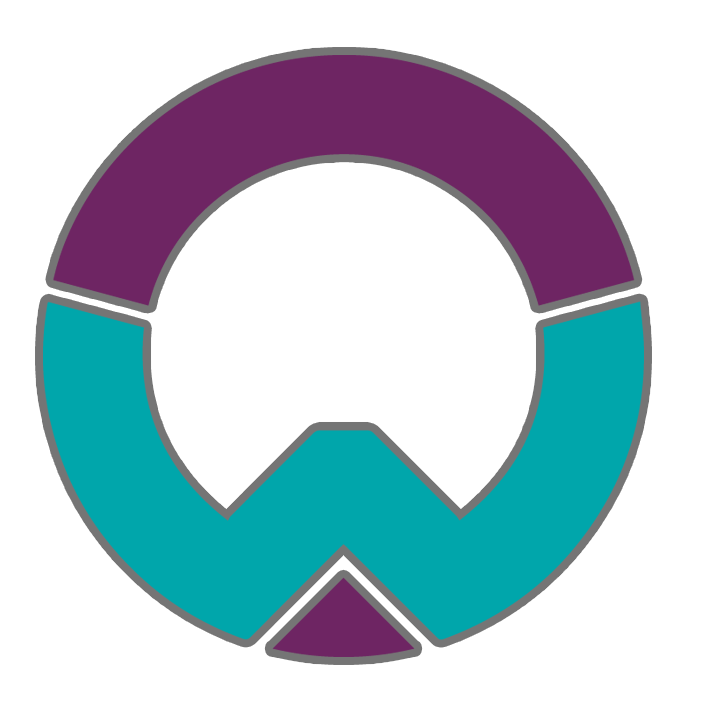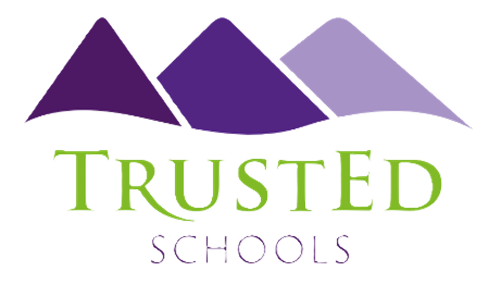About Our Subject
As we move through the 21st Century the use of technology and knowledge of computer systems has become increasingly important in both our every day and working lives. It is essential that we equip our young people to be proficient in the use of technology and develop their transferable skills to enable them to progress into further education and the world of work. At Oldbury Wells School we are passionate about educating pupils of all abilities to achieve these goals.
Key Stage 3 Computing
In years 7-9 pupils follow the KS3 national curriculum for Computing. Pupils work on a number of exciting projects which strengthens their knowledge, application, skills and analysis of:
- Algorithms: Be able to comprehend, design, create, and evaluate algorithms
- Computer networks: Understand how networks can be used to retrieve and share information, and how they come with associated risks
- Computer systems: Understand what a computer is, and how its constituent parts function together as a whole
- Creating media: Select and create a range of media including text, images, sounds, and video
- Data and information: Understand how data is stored, organised, and used to represent real-world artefacts and scenarios
- Design and development: Understand the activities involved in planning, creating, and evaluating computing artefacts
- Effective use of tools: Use software tools to support computing work
- Impact of technology: Understand how individuals, systems, and society as a whole interact with computer systems
Key Stage 4 Computing
At KS4,pupils have the opportunity to study a GCSE in Computer Science or an OCR National in iMedia.
OCR GCSE Computer Science J277
“Whether you want to uncover the secrets of the universe, or you want to pursue a career in the 21st Century, basic computer programming is an essential skill to learn.” - Stephen Hawking
GCSE Computer Science is a course designed to give you an in-depth understanding of how computer technology works and provides an opportunity to look at what goes on “behind the scenes”. The OCR GCSE in Computer Science comprises of two exam papers each worth 50% of the final grade.
Component 1: Computer systems
This component will assess:
- 1.1 Systems architecture
- 1.2 Memory and storage
- 1.3 Computer networks, connections and protocols
- 1.4 Network security
- 1.5 Systems software
- 1.6 Ethical, legal, cultural and environmental impacts of digital technology
Component 2: Computational thinking, algorithms and programming
This component will assess:
- 2.1 Algorithms
- 2.2 Programming fundamentals
- 2.3 Producing robust programs
- 2.4 Boolean logic
- 2.5 Programming languages and Integrated Development Environments
KS4 OCR Creative iMedia
The Cambridge National in Creative iMedia equips pupils with a range of creative media skills and provide opportunities to develop, in context, desirable, transferable skills such as research, planning, and review, working with others and communicating creative concepts effectively. Through the use of these skills, pupils will ultimately be creating fit-for-purpose creative media products. The OCR Cambridge National in Creative iMedia will also challenge all students, including high attaining students, by introducing them to demanding material and techniques; encouraging independence and creativity and providing tasks that engage with the most taxing aspects of the National Curriculum.
- R093: Creative iMedia in the Media Industry
- R094: Visual Identity and digital graphics - NEA
- R095: Characters and comics – NEA
Legacy Specification
- R081: Pre-Production Skills - Exam
- R082: Creating Digital Graphics - Coursework
- R084: Storytelling with a comic strip - Coursework
- R087: Creating interactive multimedia products–Coursework
Sixth form
IT Cambridge Technical Extended Certificate
QUALIFICATION
Level 3
Exam Board: OCR
REQUIREMENTS
5 GCSEs at Grade 5 or equivalent.
Why study IT?
We live in the 21st Century and today everything is about technology. Information is paramount and Information Technology (IT) influences all kinds of activity. Employers are calling out for people who can help them develop their systems or the systems for their customers, and use IT as a tool to analyse data and develop applications. This qualification is designed to give students a range of specialist knowledge and transferable skills in context of Applied IT.
What skills are required?
Normally, a student would choose OCR Cambridge Technical Extended Certificate in IT because they have successfully gained Level 2 qualifications in a similar or related subject, but there are no formal entry or prior learning requirements for this qualification.
Students studying IT benefit from having the following skills: problem solving, planning, organisation, communication and team work.
It is important that you also have a keen interest in IT and developments in IT.
Course Content
In the first year you will study the following units:
- Unit 1: Fundamentals of IT
- Unit 2: Global Information
During this year you will prepare for 2 examinations. Prior to your unit 2 exam you will be provided with a case study from the examination board. This is used to prepare for section A of the unit 2 examination.
In the second year of study you will study for one external examination and complete two pieces of coursework.
Exam
- Unit 3: Cyber Security
Similar to unit 2, prior to your unit 3 exam you will be provided with a case study from the examination board. This is used to prepare for section A of the unit 3 examination.
Coursework
- Unit 8: Project Management
- Unit 9: Product Development
For your coursework you will study the theoretical aspects of each unit as well as the practical skills required to complete your coursework. The coursework will be based around a client brief. Your solution will need to meet both client and user requirements.
How will it be assessed?
Unit 1
- Fundamentals of IT - Exam
Unit 2
- Global Information - Exam
Unit 3
- Cyber Security - Exam
(Units 1, 2, 3 - 66.7%)
Unit 8
- Project Management - Coursework
Unit 9
- Product Development - Coursework
(Units 8 & 9 worth 33.3%)
Progression
Students could progress onto to a related Higher Education (HE) course, a Level 4 apprenticeship such as Software Developer or into employment in the IT sector in areas such as technical support, digital technologies or application development.
Typical job roles are; Web Application Developer, Application Developer, Web or Application Designer, Software Analyst, Network Manager or technical support such as an IT technician.
Staff Contact
[email protected]
Computer Science
QUALIFICATION
Advanced Level
Exam Board: OCR
REQUIREMENTS
A grade 6 in GCSE Computer Science and GCSE Mathematics
or Grade 7 in GCSE Mathematics
Why study Computer Science?
Computer Science is at the forefront of the modern and changing world of computing. It is a theoretical and practical subject where students can apply the academic principles learned in class to real world systems. It is also a creative subject that combines invention and excitement and can look at the natural world through a digital prism. In addition, the course enables you to learn to program using programming languages that are sought after in industry.
What skills are required?
Computer Science is an innovative subject and skills such as problem solving and being able to apply computational thinking to solve complex problems are advantageous. Computational thinking is an important part of A Level Computer Science as the course will require you to identify and break down problems, extract key information, and develop a workable solution which is then tested and evaluated. Students opting for this course will build upon, refine, and explore these skills further as they progress through the course.
Course Content
The A Level Computer Science qualification splits learning into three units:
01 Computer Systems
- The characteristics of contemporary processors, input, output and storage devices
- Software and software development
- Exchanging data
- Data types, data structures and algorithms
- Legal, moral, cultural and ethical issues
02 Algorithms and Programming
- Elements of computational thinking
- Problem solving and programming
- Algorithms to solve problems and standard algorithms
03 Programming Project
Students choose a computing problem to work through according to the guidance in the specification.
- Analysis of the problem
- Design of the solution
- Developing the solution
- Evaluation
How will it be assessed?
01 Computer Systems
- 40% of total A Level
- 2 hour 30 minutes written paper exam
- 140 marks
- No calculator allowed
02 Programming Techniques and Logical Methods
- 40% of total A Level
- 2 hour 30 minutes written paper exam
- 140 marks
- No calculator allowed
03 A Programming Project
- 20% of total A Level
- Non-exam Assessment
Progression
There are many opportunities to study computer science or related courses at university following an A Level in Computer Science. Examples include artificial intelligence, software engineering, cyber security, computer networks and games programming.
Following an A Level in Computer Science there are also opportunities to apply for an apprenticeship in a related field such as computer networks and cyber security.
Seeking industry certification is another path to a career within the industry. An example of this is the Cisco Certified Network Associate (CCNA).
Staff Contacts
